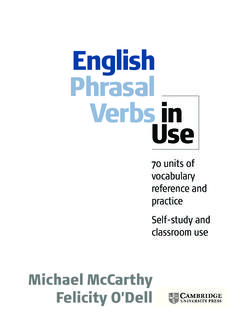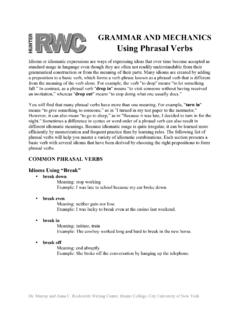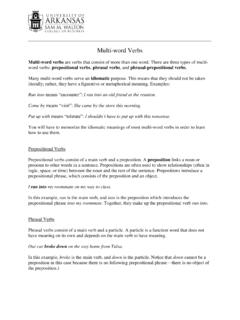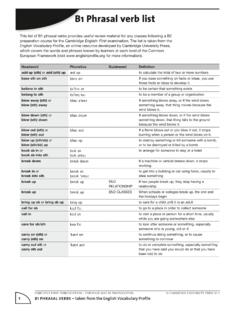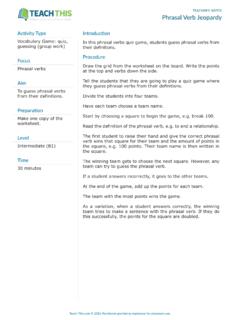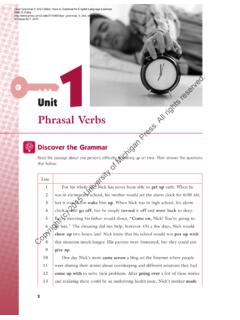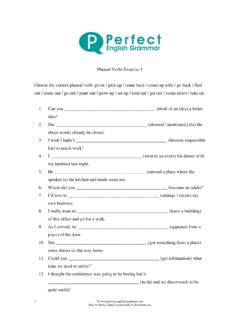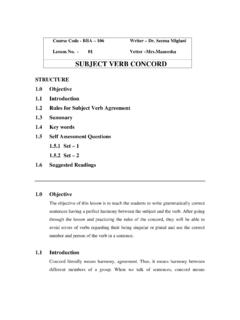Transcription of Phrasal Verbs - EC English
1 / / is a Phrasal verb ? 4 Transitive and Intransitive Phrasal Verbs 4 Separable and Inseparable Phrasal Verbs 5 Add Up 6 Drop Off 6 Break Down 7 Pick Up 7 Put Out 8 Step On 8 Dawn On 9 Fall Out 9 Look Into 10 Let Down 10 Hold Up 11 Act Up 11 Look Up 12 Break Off 12 Pick Up 11 Back Up 13 Strike Out 13 Count On 13 Get Over 14 Put Down 14 Bring Down 15 Let Down 15 Brush Off 16 Drift Apart 16 Bring Up 17 Screw Up 17 Test your Knowledge 18 Answers 21 / / is a Phrasal verb ? Phrasal Verbs are a rather complex piece of language, and language learners often have trouble connecting some Phrasal Verbs to their meanings.
2 Why is that? A Phrasal verb has a different meaning to that of the original verb but this is also what makes them fun! Let s take a look at the structure of a Phrasal verb : Phrasal Verbs are used quite often in everyday speech, usually in place of a more formal expression. Here are a couple of examples:I need to write an essay by next week, but I keep postponing need to write an essay by next week, but I keep putting it was seen exiting the car at 7 pm. She was seen getting out of the car at 7 pm. But wait! There are many Verbs in English which are followed by prepositions or adverbs used in a literal sense.
3 When something is described as literal , it is to be taken in its most basic sense: If you look up, you will see a beautiful blue sky. [Literal]I don t know what this word mean. I m going to look it up in a dictionary. [Meaning to search for ] ( verb ) + (preposition)( verb ) + (adverb)( verb ) + (adverb) + (preposition)= a Phrasal verbTransitive and Intransitive Phrasal VerbsA Phrasal verb can be transitive or intransitive. The best way to understand the difference between these two types of Verbs is by trying to find the direct object. The direct object is a noun or noun phrase referring to a person or thing which is receiving the action of a transitive verb .
4 To sum up - Transitive Phrasal Verbs have a direct I will set up a meeting with the manager. What is being set up ? The meeting with the manager. John gave up smoking 5 years ago. What did John give up 5 years ago? Smoking. Intransitive Phrasal Verbs have no direct Francesco said he would meet us at 6pm, but he never showed up. Katy grew up in Brighton, England. 1 To postpone (something): to do something at a later time than you first To run into: to meet someone unexpectedly, without planning to do , let s review what we know about Phrasal Verbs :1.
5 The meaning of a Phrasal verb is different from the meaning of its separate An intransitive verb cannot be followed by an A transitive verb can be followed by an Some transitive Verbs can be separated. The object goes between the verb and the preposition. 5. Some transitive Phrasal Verbs are inseparable. The object is placed after the preposition. 6. Some transitive Phrasal Verbs can take an object in both places. Separable and Inseparable Phrasal VerbsA large number of Phrasal Verbs are transitive, meaning that they take an object. There are some specific rules for using this type of Phrasal verb .
6 Let s take a look at some write down [separable]Ali wrote down some important notes during the wrote everything down during the lesson. run into2 [inseparable] We always run into Daniel at parties. Correct :) We always run Daniel into parties. Incorrect :(Remember! Some Phrasal Verbs can be both transitive and intransitive, with different look upTransitive: It is important to look up any new vocabulary in a dictionary. - Here, look up means to search for : It has been a difficult year, but things are starting to look up. - Now, look up means to get better or improve. / / are hundreds of Phrasal Verbs in the English language.
7 Let s take a look at some illustrated examples of some of the most useful ones!Add UpThe Phrasal verb add up can be used in two main ways. Add up also means to make sense : His theory doesn t add up. I don t think he did enough research. (His ideas were not clear or logical) Add up to is used to talk about an equalled amount, The total bill added up to $10. (My food cost $5 and my friend s food cost $5. $5 + $5 = $10) Break DownThe Phrasal verb Break down + noun can be used to talk about analysing something in detail: You need to break down the maths problem in order to solve it properly.
8 Break down is also used to talk about something that has stopped working properly: Can you please come and pick me up from work? My car has broken down. (My car is not working, so could you please come and get me with your car?) Break down can be used to describe a person who has started to cry because they are under a lot of stress or a experiencing something very negative: When she found out the news of her friend s death she broke down in tears. (She heard some very bad news and started to cry uncontrollably)Drop OffIn this situation, to drop off is a Phrasal verb which means to fall asleep.
9 Drop off has quite a few different meanings, depending on the situation or context: 1. Similar to fall The boys dropped stones off the An informal way of saying fall asleep I dropped off while watching TV last night3. To gradually decline/ become lessSales dropped off at the end of the month4. To stop somewhere for someone Could you drop me off at the station?5. To stop and give something to someoneCould you drop this letter off at the post office for me?In the cartoon above, pick (it) up means to lift something up off the ground. The man in the picture is picking the rubbish bin up to put the rubbish into the truck.
10 Let s take a look at just how many different meaning this Phrasal verb can have: 1. To lift an object with the handsKeep your back straight when you pick the TV To learn something without effortIt s possible to pick up enough English in two weeks to get by on your trip to To go and get someone in a car What time are you going to pick me To try to start a relationship with someone you do not know. Some strange man tried to pick up Lucy in the bar. 5. To grow or increase Business is really picking up this month. Pick Up / / OutIn this situation, the man and woman have misunderstood 3 each other because put out has a few different meanings.
